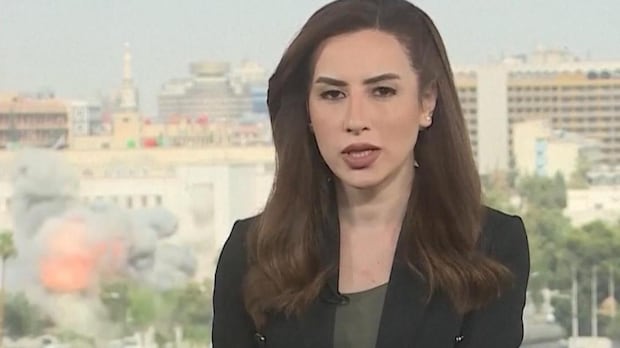Clashes escalate in Syria's Druze region despites calls for sides to respect ceasefire
Syria's interim president blames 'Israeli intervention' for fuelling instability
Sectarian clashes escalated in Syria's predominantly Druze region of Sweida on Saturday, with machine-gun fire and mortar shelling ringing out after days of bloodshed as the Islamist-led government struggled to implement a ceasefire.
Reuters reporters heard gunfire from inside the city of Sweida and saw shells land in nearby villages. There were no immediate, confirmed reports of casualties.
The government had said security forces were deploying in the southern region to try to keep peace, and it urged all parties to stop fighting after nearly a week of factional bloodshed in which hundreds have been killed.
Mansour Namour, a resident of a village near Sweida city, said mortar shells were still landing near his home on Saturday afternoon and that at least 22 people had been wounded.
A doctor in Sweida said a local hospital was full of bodies and wounded people from days of violence.

"All the injuries are from bombs, some people with their chests wounded. There are also injuries to limbs from shrapnel," said Omar Obeid, the hospital's director.
Late on Saturday, the Interior Ministry said clashes in Sweida city had been halted and the area cleared of Bedouin tribal fighters following the deployment.
The Syrian Observatory for Human Rights, a British-based monitoring group, said clashes since last week around Sweida had killed at least 940 people. Reuters could not independently verify the toll.
Syria's interim president, Ahmed al-Sharaa, said "Arab and American" mediation had helped restore calm, before the clashes escalated. He criticized Israel for airstrikes during the week.

The fighting is the latest challenge to the control of Sharaa's Islamist-dominated government, which took over after rebels toppled autocratic president Bashar al-Assad in December.
It started last week as clashes between the Druze — a religious minority native to southern Syria, the Israeli-occupied Golan Heights and parts of Lebanon and Jordan — and Syrian Bedouin tribes.
Government forces then arrived to try to quell tensions, clashing with Druze gunmen and attacking the Druze community.
Saturday's violence once again pitted Druze against Bedouin, witnesses said.
Syria's presidency decries 'Israeli intervention'
The fighting has drawn in neighbouring Israel, which carried out airstrikes in southern Syria and on the Defence Ministry in Damascus this week while government forces were fighting with the Druze. Israel says it is protecting the Druze, who also form a significant minority in Israel.
But Israel and Washington differ over Syria. The United States supports a centralized Syria under Sharaa's government, which has pledged to rule for all citizens, while Israel says the government is dominated by jihadists and a danger to minorities.
In March, Syria's military was involved in mass killings of members of the Alawite minority, to which much of Assad's elite belonged.
In a statement on Saturday, the Syrian presidency announced an immediate ceasefire and urged an immediate end to hostilities. Sharaa said Syria would not be a "testing ground for partition, secession or sectarian incitement."
"The Israeli intervention pushed the country into a dangerous phase that threatened its stability," he said in a televised speech.
Sharaa appeared to blame Druze gunmen for the latest clashes, accusing them of revenge attacks against Bedouins.
Israeli Foreign Affairs Minister Gideon Saar said Sharaa was siding with the perpetrators.
"In al-Sharaa's Syria, it is very dangerous to be a member of a minority — Kurd, Druze, Alawite, or Christian," he posted on social media platform X.
U.S. envoy Tom Barrack announced on Friday that Syria and Israel had agreed to a ceasefire.
Barrack, who is both U.S. ambassador to Turkey and Washington's Syria envoy, urged Druze, Bedouins and Sunnis, together with other minorities, to "build a new and united Syrian identity."
Israel has attacked Syrian military facilities in the seven months since Assad fell, and says it wants areas of southern Syria near its border to remain demilitarized.
On Friday, an Israeli official said Israel had agreed to allow Syrian forces limited access to Sweida for two days.
